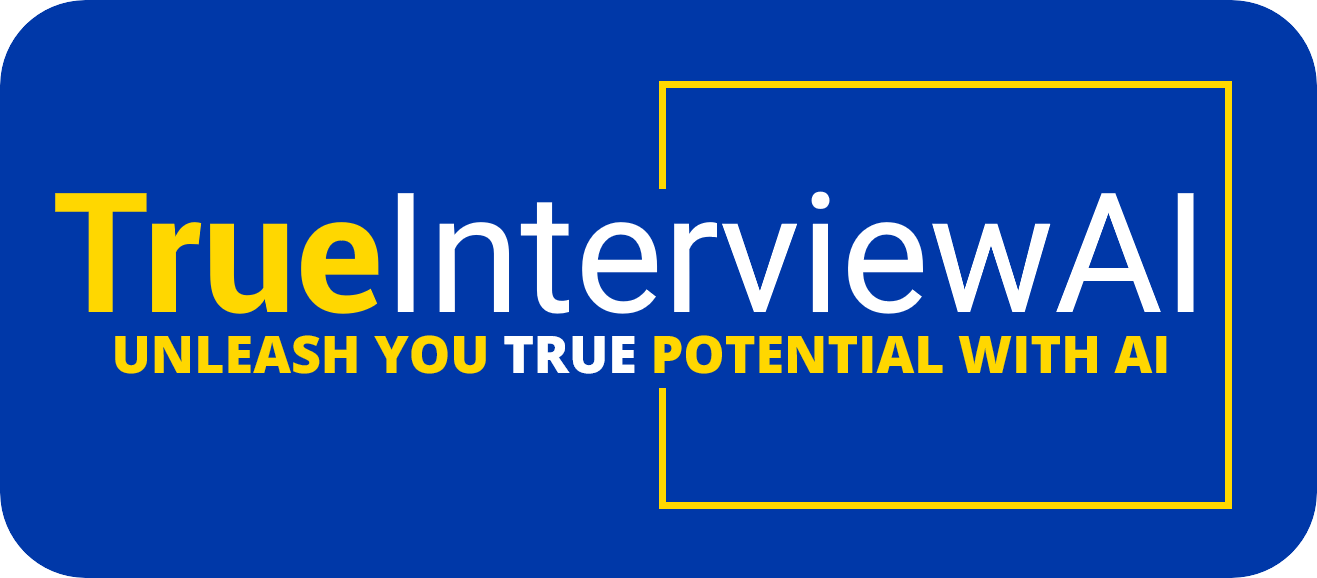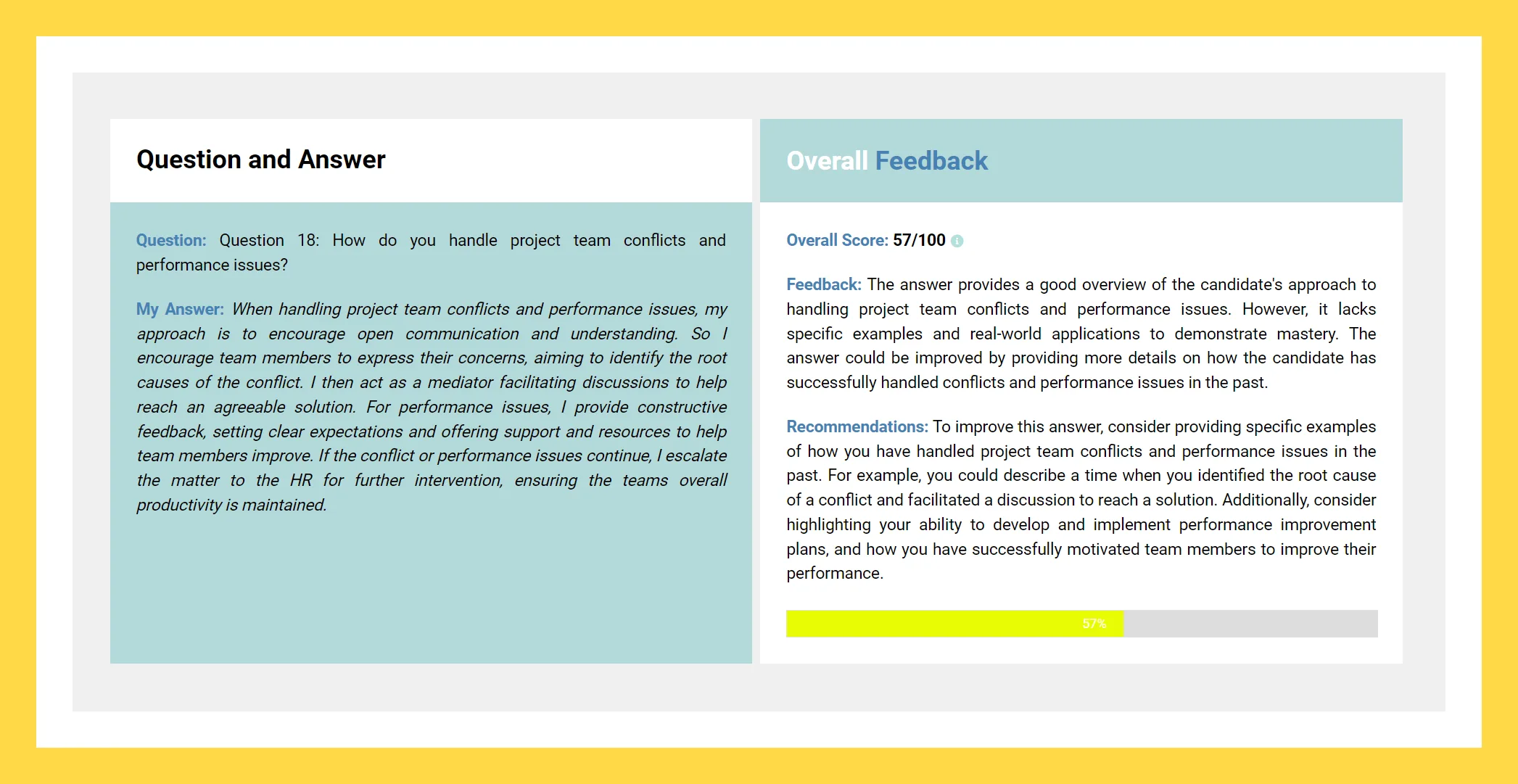Type a job title or job details to see your interview questions.
Choose a question and record your answer to sharpen your skills.
 Practice with Role-Based Questions
Practice with Competency Questions
Sign Up
Practice with Role-Based Questions
Practice with Competency Questions
Sign Up
Change your outcomes with a Free Trial. Practice with mock interviews, face job-specific questions, and get instant AI-powered expert feedback to nail your next interview.
Click here to startType a job title or job details to see your interview questions.
Choose a question and record your answer to sharpen your skills.

Get your answer reviewed with score, feedback, transcript, and tips.

Get strategy-based feedback on your interview questions and see where to level up.

Receive tailored tips for each interview question or the competency being assessed.

Go to Dashboard and track your progress across interview questions, job titles, strategies, and key skills.


Paste your job description or job title, generate the most likely interview questions, train by recording your answers, and get instant recommendations that integrate the 7 strategies and other techniques to improve. This includes various formats, including competency-based.
Paste your job description or job title, select a competency and question, train by recording your answers, and get instant recommendations that integrate the 7 strategies and other targeted improvements.
Using these strategies in public content must credit TrueInterviewAI.
Our smart models tailor feedback to your answers, linking them to these 7 core strategies and related question cues.
Don't play a role or pretend to match the job perfectly. Be who you are, because honesty—even with skill gaps—is respected. People usually know when someone is authentic. Show up as yourself and own the moment.
Genuine people naturally earn trust and interest. This quality helps you stand out and makes your conversation easier to recall and more impactful.
When you’re genuine, you build trust fast—and that’s a big factor when interviewers choose who gets the job.
Everyone connects better when you give context. It helps interviewers truly understand your story by placing them in the moment, time, and location—allowing for deep, relatable communication and a stronger connection to your experience.
Context paired with ripple effects is powerful. It shows how your work made an impact beyond your actions. For example: "I began work in a remote area after a major earthquake had displaced 1.5 million people." Always show outcomes and how they went beyond you and benefited others.
Just like good stories draw people in, sharing rich background makes your answers stand out. You become more interesting, relatable, and memorable to the hiring team.
Don't talk about yourself only. Shift the focus to others. Speak about their issues or challenges, and how you stepped in to support or solve them.
Even for personal prompts like "Tell me about yourself," you don’t need to make it all about you. Frame your value around the job, and explain how you’ll support your team and the goals of the organization.
If someone says, "I have a top education" or "lots of experience"—do they impress you? Most interviewers prefer candidates who show humility. Highlight others’ efforts or how you helped, and you’ll leave a better impression.
Don’t speak like you’re on stage; many applicants fall into this trap. Use natural tone, avoid rehearsed answers. Reciting lines makes things sound fake and can raise doubts. Instead, prep key ideas and examples in advance—but don’t memorize them. Keep it real, stay relaxed, and speak like you would in a good back-and-forth.
Don’t hesitate to ask or interact during the interview. That makes it feel more like a conversation and shows that you’re engaged. This attitude shows strong interest and professional maturity.
The strongest interviews often feel like relaxed chats. The most likable candidates sound natural and human. Avoid giving overly long or formal answers—they tend to drag and break the flow of the conversation.
Group job duties into four key areas. When responding to questions, show how your background links to one or more of those groups. Provide examples that clearly connect you to these priorities.
Repeating how you align with job priorities isn’t overkill—it’s strategy. In each answer, make it clear where you fit. In some answers, just mention 1 or 2 areas. In others (e.g., “tell me about yourself”), cover all 4. Tailor it based on the question to keep it smooth.
When a question calls for direct alignment with the job, start with the job’s needs—not your background. Then connect your experience to them. This job-first framing helps interviewers immediately see your fit for what they truly care about.
Don’t aim to sound flawless. Speak openly about obstacles you've dealt with and how you managed to move past them. This helps interviewers see your strength and makes your answer both inspiring and human.
Candidates who show the emotional depth of their story—especially when facing struggles—stand out more. Don’t hide your setbacks. Showing that you bounced back reveals maturity and grit. That's what people remember most.
Let interviewers see the person behind the role. Sharing a relevant hobby or non-work detail shows personality and relatability. When done briefly and well-timed, it builds warmth and trust with the panel.
Keep a positive energy from start to end—even when you’re speaking about tough moments. Use language that’s upbeat but honest. This balance leaves a lasting, genuine impact on interviewers.
Interviewers don’t enjoy negativity. Show how you add light to team dynamics—even when things aren’t going well. But be real: you don’t need to be a superhero. Stay humble and authentic while keeping your tone optimistic.
Let your confidence shine by sharing how you’ve faced hard times with strength. People admire courage—and showing how you stayed calm and positive under pressure leaves a strong impression on interviewers.